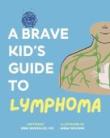A Brave Kid’s Guide to Lymphoma by Nina Gonzalez, MD
Hello Brave Co, 2024, 49 Pages, Paperback
ISBN: 979-8990710511
Charlie is a curious kid facing a big challenge: lymphoma. With so many questions swirling in his mind, Charlie finds a friend in Cobi, the super smart Brave Buddy who helps kids understand their medical diagnoses. Together, they set off on a journey of understanding, and Charlie realizes just how Brave he is.
A Brave Kid's Guide to Lymphoma is designed to help children understand their lymphoma diagnosis. Created by Dr. Nina Gonzalez and the Hello Brave team, this book breaks down complex medical information into simple, clear language and illustrations. Through an engaging conversation between Cobi and Charlie, this book helps to dispel common misconceptions and provides comfort through a shared understanding of this challenging diagnosis. At the end of the book, you'll find a glossary of easy-to-understand terms, guides for adults on how to talk about tough diagnoses like lymphoma with kids, questions to ask your care team, and a Brave Kid Certificate to honor your child's bravery and strength. This book is a supportive tool for both patients and families dealing with lymphoma.
For more information click here

Audience
Teens & Children



